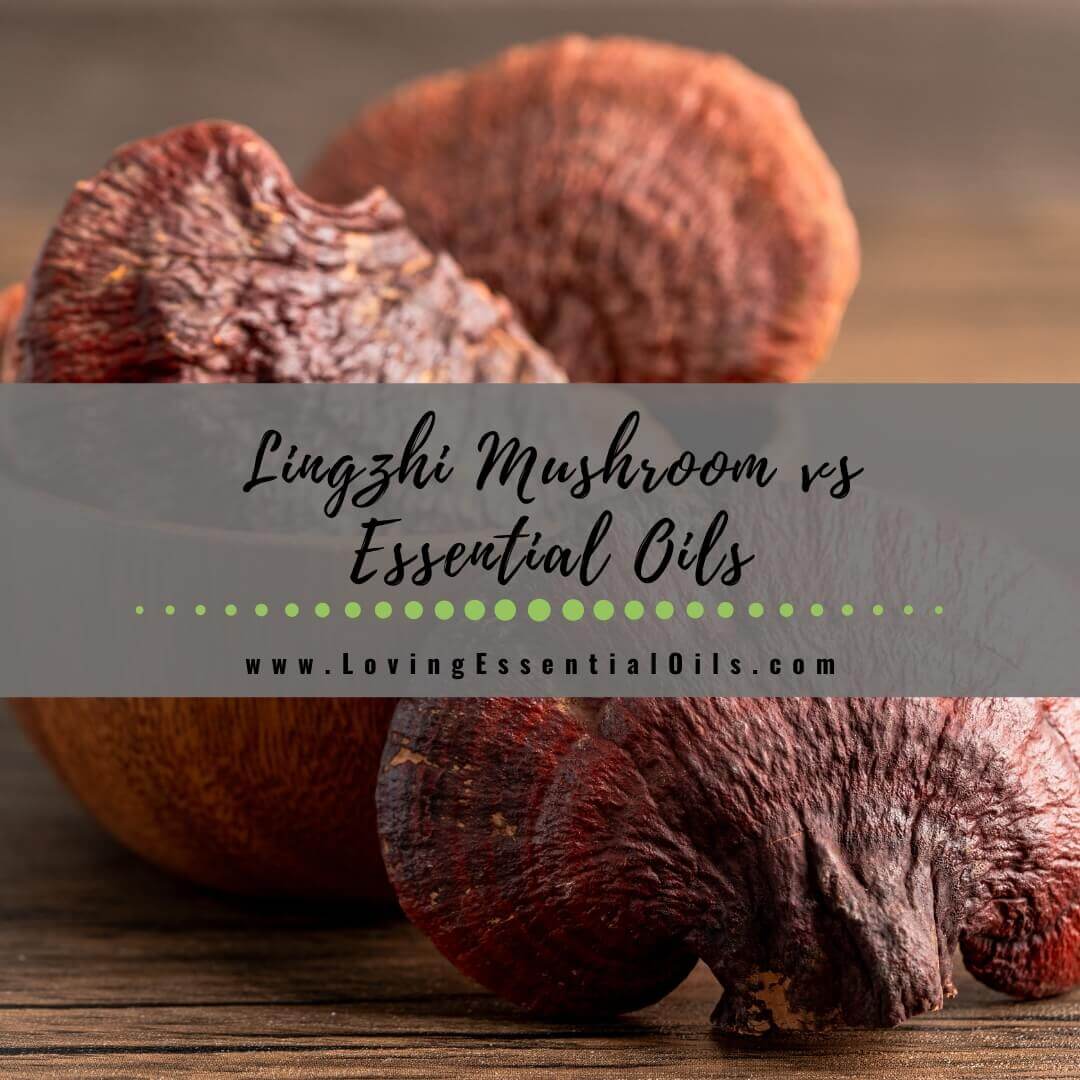While both lingzhi mushroom and essential oils are believed to have medicinal properties, they differ in their composition and mode of action. Lingzhi mushroom contains a variety of bioactive compounds, including polysaccharides, triterpenes, and beta-glucans, which are thought to have immune-boosting and anti-inflammatory effects. Essential oils, on the other hand, are composed of volatile aromatic compounds that can be absorbed through the skin or inhaled, and are believed to have a range of therapeutic effects on the body and mind.
In this article, we will compare and contrast the potential health benefits of lingzhi mushroom and essential oils, and explore the scientific evidence behind their use. We will also discuss their potential side effects and interactions with other medications, and provide tips for incorporating these natural remedies into your health and wellness routine.
Overview of Lingzhi Mushrooms
Lingzhi mushrooms, also known as reishi mushrooms, are a type of fungus that has been used for medicinal purposes in traditional Chinese medicine for centuries. These mushrooms are believed to have various health benefits due to their high concentration of bioactive compounds.
Lingzhi mushrooms are known for their unique appearance, with a reddish-brown cap and a woody stem. They are typically grown on the logs of deciduous trees, such as oak, maple, and birch.
In traditional Chinese medicine, lingzhi mushrooms have been used to boost the immune system, improve cardiovascular health, and reduce inflammation. They are also believed to have anti-cancer properties and have been used as a complementary treatment for cancer patients.
Modern research has confirmed many of the health benefits associated with lingzhi mushrooms. Studies have shown that these mushrooms contain polysaccharides, triterpenes, and other bioactive compounds that can help reduce inflammation, boost the immune system, and improve overall health.
Lingzhi mushrooms are available in various forms, including capsules, powders, and extracts. They can also be consumed in teas and soups. While lingzhi mushrooms are generally considered safe, individuals who are allergic to mushrooms should avoid them. It is also important to consult with a healthcare provider before using lingzhi mushrooms as a complementary treatment for any health condition.
Overview of Essential Oils
Essential oils are highly concentrated plant extracts that are obtained through steam distillation, cold pressing, or solvent extraction. They are used in aromatherapy, massage therapy, and as natural remedies for various health conditions. Essential oils are made up of volatile compounds that give them their characteristic aroma and therapeutic properties.
There are hundreds of essential oils available, each with its own unique properties and uses. Some of the most popular essential oils include lavender, peppermint, tea tree, eucalyptus, and lemon. Essential oils can be used topically, inhaled, or ingested, although ingestion should only be done under the guidance of a qualified aromatherapist or healthcare provider.
Essential oils are often used for their therapeutic properties, such as their ability to reduce stress, improve sleep, relieve pain, and boost immunity. They are also used in skincare products, hair care products, and household cleaners due to their antibacterial and antifungal properties.
It is important to note that essential oils are highly concentrated and should be used with caution. They should be diluted with a carrier oil before being applied topically, and should never be ingested in their undiluted form. Some essential oils may also cause skin irritation or allergic reactions in some individuals, so it is important to do a patch test before using any new essential oil.
Historical Uses

Lingzhi in Traditional Medicine
Lingzhi mushroom, also known as reishi, has been used in traditional Chinese medicine for over 2,000 years. It was believed to have various health benefits, including boosting the immune system, reducing inflammation, and improving overall health and longevity.
In ancient times, lingzhi was reserved for royalty and was considered a symbol of good luck and prosperity. It was also used as a tonic to promote longevity and enhance spiritual awareness. Today, lingzhi is still widely used in traditional medicine practices in China and other parts of Asia.
Essential Oils in Aromatherapy
Essential oils have been used for thousands of years in various cultures for their healing properties. The ancient Egyptians, Greeks, and Romans all used essential oils in their daily lives for medicinal, cosmetic, and religious purposes.
In modern times, essential oils have gained popularity in aromatherapy, which is the use of essential oils to promote physical and emotional well-being. Essential oils are believed to have various health benefits, including reducing stress and anxiety, improving sleep, and relieving pain and inflammation.
Overall, both lingzhi mushroom and essential oils have a long history of use in traditional medicine practices. While their specific uses and benefits may vary, they both continue to be used today for their potential health-promoting properties.
Active Compounds
Compounds in Lingzhi
Lingzhi mushroom, also known as reishi mushroom, contains various active compounds that contribute to its health benefits. The main bioactive compounds in lingzhi are triterpenoids, polysaccharides, and peptidoglycans. Triterpenoids are believed to have anti-inflammatory and antioxidant properties, while polysaccharides are known for their immune-modulating effects. Peptidoglycans have been shown to have antitumor activity.
In addition to these compounds, lingzhi also contains other bioactive substances such as adenosine, ganoderic acids, and ergosterol. Adenosine is a nucleoside that has been found to have cardiovascular benefits. Ganoderic acids are triterpenes that have been shown to have antitumor, anti-inflammatory, and antiviral properties. Ergosterol is a precursor to vitamin D and has been shown to have immunomodulatory effects.
Components of Essential Oils
Essential oils are concentrated extracts of aromatic plants. The main components of essential oils are terpenes and terpenoids. Terpenes are hydrocarbons that give essential oils their characteristic aroma, while terpenoids are modified terpenes that have additional functional groups.
Some of the most common terpenes found in essential oils include limonene, pinene, and linalool. Limonene is found in citrus oils and has been shown to have anti-inflammatory and anticancer properties. Pinene is found in pine and fir oils and has been shown to have antimicrobial and anti-inflammatory effects. Linalool is found in lavender and other floral oils and has been shown to have sedative and anxiolytic effects.
In addition to terpenes and terpenoids, essential oils also contain other bioactive compounds such as phenols, aldehydes, and ketones. Phenols have been shown to have antioxidant and antimicrobial properties, while aldehydes and ketones have been shown to have antifungal and antiviral effects.
Health Benefits
Benefits of Lingzhi
Lingzhi mushroom, also known as Ganoderma lucidum, has been used in traditional Chinese medicine for centuries. It is believed to have various health benefits, including:
- Boosting the immune system: Lingzhi contains beta-glucans, which can stimulate the immune system and help fight off infections.
- Reducing inflammation: Lingzhi has anti-inflammatory properties that may help reduce inflammation in the body, which can be beneficial for those with chronic conditions such as arthritis.
- Improving heart health: Some studies have suggested that lingzhi may help lower cholesterol levels and blood pressure, which can improve heart health.
Benefits of Essential Oils
Essential oils are highly concentrated plant extracts that are used in aromatherapy and other holistic practices. Some of the potential health benefits of essential oils include:
- Reducing stress and anxiety: Certain essential oils, such as lavender and chamomile, have calming properties that can help reduce stress and anxiety.
- Relieving pain: Essential oils such as peppermint and eucalyptus have analgesic properties that can help relieve pain when used topically.
- Improving skin health: Some essential oils, such as tea tree oil and lavender oil, have antimicrobial properties that can help improve skin health and treat conditions such as acne and eczema.
Overall, both lingzhi mushroom and essential oils have potential health benefits, but it is important to use them safely and appropriately. It is recommended to consult with a healthcare professional before using any new supplements or treatments.
Application Methods
Consuming Lingzhi
Lingzhi mushroom can be consumed in various forms such as capsules, tea, or as a powder. The recommended dosage of lingzhi mushroom supplements varies depending on the form of consumption, body weight, and health condition. It is important to follow the instructions provided by the manufacturer or consult a healthcare professional before taking lingzhi mushroom supplements.
Consuming lingzhi mushroom tea is a popular method of intake. To make lingzhi mushroom tea, the dried mushroom is boiled in water for several hours until the water turns a reddish-brown color. The tea can be consumed hot or cold and can be sweetened with honey or other natural sweeteners.
Using Essential Oils
Essential oils can be used in various ways such as inhalation, topical application, and ingestion. However, it is important to note that not all essential oils are safe for ingestion and should only be used under the guidance of a healthcare professional.
Inhalation is a common method of using essential oils. This can be done by adding a few drops of essential oil to a diffuser or by inhaling the oil directly from the bottle. Topical application involves applying diluted essential oil to the skin. It is important to dilute essential oils with a carrier oil such as coconut oil or jojoba oil before applying them to the skin to avoid skin irritation.
Overall, both lingzhi mushroom and essential oils have their unique application methods. It is important to understand the appropriate dosage and method of intake for both to ensure safe and effective use.
Safety and Side Effects
Lingzhi Cautions
Lingzhi mushroom is generally considered safe for most people when consumed in moderate amounts. However, it may cause side effects in some individuals. These side effects include dry mouth, dizziness, upset stomach, and skin rashes. Lingzhi may also interact with certain medications, such as blood thinners, and should be avoided by pregnant or breastfeeding women.
It is important to note that lingzhi is not a substitute for medical treatment and should not be used to treat any medical condition without consulting a healthcare professional.
Essential Oils Precautions
Essential oils are generally safe when used properly, but they can cause side effects if not used correctly. Some essential oils may cause skin irritation, allergic reactions, or respiratory problems. It is important to dilute essential oils before applying them to the skin and to avoid using them near the eyes, mouth, or nose.
Essential oils should not be ingested unless under the guidance of a qualified healthcare professional. They should also be kept out of reach of children and pets.
It is important to note that essential oils are not a substitute for medical treatment and should not be used to treat any medical condition without consulting a healthcare professional.
In conclusion, both lingzhi mushroom and essential oils have potential benefits, but they should be used with caution and under the guidance of a qualified healthcare professional. It is important to be aware of the potential side effects and to use these products properly to avoid any adverse reactions.
Scientific Research
Studies on Lingzhi
Scientific research has been conducted to investigate the potential health benefits of Lingzhi mushroom. A study published in the International Journal of Medicinal Mushrooms in 2011 found that Lingzhi mushroom extract had anti-inflammatory properties and could help reduce inflammation in the body. Another study published in the Journal of Ethnopharmacology in 2008 found that Lingzhi mushroom extract had anti-tumor effects and could help slow the growth of cancer cells.
Research on Essential Oils
Essential oils have also been the subject of scientific research. A study published in the Journal of Alternative and Complementary Medicine in 2012 found that lavender essential oil had a calming effect on the nervous system and could help reduce anxiety. Another study published in the Journal of Food Science in 2013 found that oregano essential oil had antimicrobial properties and could help prevent the growth of harmful bacteria.
Overall, both Lingzhi mushroom and essential oils have been the subject of scientific research, and there is evidence to suggest that they may have potential health benefits. However, more research is needed to fully understand the effects of these natural remedies.
Market Trends
Lingzhi Products
The demand for lingzhi mushroom products has been on the rise in recent years due to its potential health benefits. Lingzhi is a popular ingredient in traditional Chinese medicine and is believed to boost the immune system, improve liver function, and reduce inflammation. As a result, many companies have started to produce lingzhi products such as capsules, powders, and teas.
According to a report by Grand View Research, the global lingzhi mushroom market size was valued at USD 2.08 billion in 2020 and is expected to grow at a compound annual growth rate (CAGR) of 8.3% from 2021 to 2028. The increasing demand for natural and organic products and the growing awareness of the health benefits of lingzhi mushrooms are some of the factors driving the market growth.
Essential Oils Industry
The essential oils industry has also been experiencing significant growth in recent years. Essential oils are concentrated extracts from plants that are used for various purposes such as aromatherapy, skincare, and cleaning products. The global essential oils market size was valued at USD 7.03 billion in 2020 and is expected to grow at a CAGR of 8.7% from 2021 to 2028.
The increasing demand for natural and organic products and the growing awareness of the health benefits of essential oils are some of the factors driving the market growth. The rise of e-commerce platforms has also made it easier for consumers to purchase essential oils online, which has further contributed to the growth of the industry.
In conclusion, both lingzhi mushroom products and essential oils have been experiencing significant growth in recent years due to the increasing demand for natural and organic products and the growing awareness of their potential health benefits.
Consumer Considerations
Choosing Lingzhi
When choosing lingzhi mushrooms, consumers should consider the quality of the product. It is important to look for products that are certified organic to ensure that they are free from harmful chemicals and pesticides. Consumers should also look for lingzhi products that have been extracted using high-quality methods to ensure that the active compounds are preserved.
Another consideration when choosing lingzhi is the form in which it is consumed. Lingzhi is available in various forms including capsules, powders, and teas. Capsules are a convenient option for those who want to take lingzhi on-the-go, while powders can be added to smoothies or other beverages. Teas are a traditional way of consuming lingzhi and can be a relaxing and enjoyable experience.
Selecting Essential Oils
When selecting essential oils, consumers should pay attention to the quality of the oil. It is important to look for oils that are 100% pure and free from additives or synthetic fragrances. Consumers should also look for oils that are certified organic to ensure that they are free from harmful chemicals.
Another consideration when selecting essential oils is the intended use. Some oils are better suited for topical use, while others are better suited for aromatherapy. Consumers should also consider the scent and choose oils that are pleasing to them.
In summary, when choosing between lingzhi mushrooms and essential oils, consumers should consider the quality of the product and the intended use. Both lingzhi and essential oils have potential health benefits, but it is important to choose products that are safe and effective.
Conclusion
After comparing Lingzhi mushroom and essential oils, it is clear that both have their unique benefits and uses. Lingzhi mushroom has been used for centuries in traditional Chinese medicine to boost the immune system, reduce inflammation, and improve overall health. Essential oils, on the other hand, have gained popularity in recent years for their therapeutic properties, such as reducing stress and anxiety, improving sleep, and treating skin conditions.
While Lingzhi mushroom and essential oils can both be used to promote health and wellness, it is important to note that they are not interchangeable. Lingzhi mushroom is typically consumed as a supplement or tea, while essential oils are used topically or aromatically. Additionally, Lingzhi mushroom has been extensively studied for its medicinal properties, while essential oils have limited scientific research to support their effectiveness.
Ultimately, the choice between Lingzhi mushroom and essential oils depends on individual needs and preferences. Those seeking a natural way to boost their immune system or reduce inflammation may benefit from Lingzhi mushroom supplements or tea. Those looking for a natural way to improve their mood or treat skin conditions may find essential oils to be a better option.
Overall, both Lingzhi mushroom and essential oils have their place in natural health and wellness. It is important to do your own research and consult with a healthcare professional before incorporating either into your daily routine.





